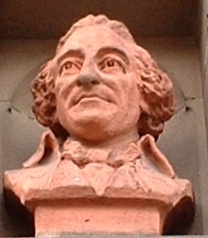Thomas Paine (1737 - 1809)

A view of the bust on the front of Secular Hall.
Tom Paine was born in Thetford, Norfolk. His father was a devout Quaker of whom he later said “My father being of the Quaker profession, it was my good fortune to have an exceedingly good moral education, and a tolerable stock of useful learning.” At the time Norfolk was a hotbed of Quaker dissenters and Tom would have been exposed to some radical thinking
In his early career he worked variously as a staymaker, teacher and excise man ending up in Lewes, Sussex in 1768 after several short term moves. Lewes had a strong Quaker community influenced by the Whig tradition of William Penn who had lived nearby. Tom became involved in organising labour and trying to negotiate better pay and conditions for excise men. As a result he lost his job and, on the advice of Benjamin Franklin, emigrated to America in 1774, with a letter of introduction from Franklin.
By 1775 he was the editor of The Pennsylvania Magazine which achieved the highest circulation of any magazine in the colonies. He associated with the “Free Quaker” group of Friends who adopted the principle "that offensive war was never to be considered, but that a war of defense was Christian and therefore justifiable."
In 1776 he published the pamphlet Common Sense (1776), and other writings , arguing for republican government and independence. These were very influential during the American revolution with "Common Sense" selling c.0.5m copies to a population of c.2m. The pamphlet provided the final and most direct impetus for the cause of independence and had a Quaker configuration characterized by the triad of pacifism, equality and simplicity. It included Paine's beliefs regarding the peaceful nature of republics and that only active pacifism, or a war for peace, would suffice since "every quiet method for peace had been ineffectual."
Paine was not involved in the Constitutional Assembly as he was in Europe, but his thinking was undoubted influential even if this is no longer acknowledged. Congress and the State of New York recognized Tom Paine's services by a grant of land for a farm in New Rochelle.
He returned to England with a view to having his design for an iron bridge built, but the French revolution of 1789, and the writings of Burke against it, inspired his very influential book Rights of Man (1791-2). William Blake, the poet, warned him to escape to France before being charged with treason.
Arriving in France he was treated as a hero as his writings had been translated and, as an enthusiastic supporter of the Revolution, was granted honorary French citizenship and elected to the French National Convention as an ally of the Girondists. During this time a young Napoleon is claimed to have paid Tom a visit stating that he slept with a copy of Rights of Man under his pillow
Due to his association with the Girondists and his arguements against both the terror and the execution of the monarch, he fell foul of Robespierre and was imprisoned. While in jail wrote his anti-religion work the Age of Reason (1793-4).
Having narrowly escaped the guillotine, Tom returned the United States in 1802. He was no longer popular due to his having fallen out with George Washington and the Age of Reason had been condemned by most religious leaders. His health declined and he died in 1809.
In his will he requested the he be buried in the New York Quaker Cemetery but this was denied as he was not a pacifist. Scandalously his bones were dug up and brought to England by Cobbett in 1819, but were then lost.
Many years later the writer and orator Robert G. Ingersoll wrote:
Thomas Paine had passed the legendary limit of life. One by one most of his old friends and acquaintances had deserted him. Maligned on every side, execrated, shunned and abhorred – his virtues denounced as vices – his services forgotten – his character blackened, he preserved the poise and balance of his soul. He was a victim of the people, but his convictions remained unshaken. He was still a soldier in the army of freedom, and still tried to enlighten and civilize those who were impatiently waiting for his death. Even those who loved their enemies hated him, their friend – the friend of the whole world – with all their hearts. On the 8th of June 1809, death came – Death, almost his only friend. At his funeral no pomp, no pageantry, no civic procession, no military display. In a carriage, a woman and her son who had lived on the bounty of the dead – on horseback, a Quaker, the humanity of whose heart dominated the creed of his head – and, following on foot, two negroes filled with gratitude – constituted the funeral cortege of Thomas Paine.
Links
Some of the pages referenced by these links have disappeared (or have changed and lost their relevance) since George Jelliss added most of them several years ago. In the meantime new resources have become available. Please do contact us (details on our homepage) if you have any updates or suggestions for this page - or any other part of our website.
Links open in a new window.
Tom Paine's Writings
List of Selected Writings
Agrarian Justice
Video
- Thomas Paine Biography
- Making History: Thomas Paine. Saleha Ali of WorldBytes and Cheryl Husdon of the Rothermere American Institute, Oxford.
- Thomas Paine (The origins of secularism & the National Secular Society) - talk by Bob Forder
- Thomas Paine - Christopher Hitchens Lecture 21 Aug 2013
- Talk from cartoonist / graphic novelist Polyp exploring his beliefs, his conflicts with religion and his amazingly dramatic life story.
Radio
In Our Time - Thomas Paine's Common Sense
Other External Links
Agrarian Justice
Tom Paine on Wikipedia
Thomas Paine: A Quaker Revolutionary
Thomas Paine Awards
Thomas Paine Society (UK)
Thomas Paine NHA Archive (US)
Who was Tom Paine? by Howard Fast
Thomas Paine Friends, Inc - newsletters and pictures of monuments from around the world, etc.
Doesn't anyone remember
Tom Paine by Robert L. Williams
George F. Smith: The Roots of Thomas Paine's Radicalism
Brendan O'Neill: Who was Thomas Paine? from BBC News Magazine
The Age of Paine by Scott Tucker











